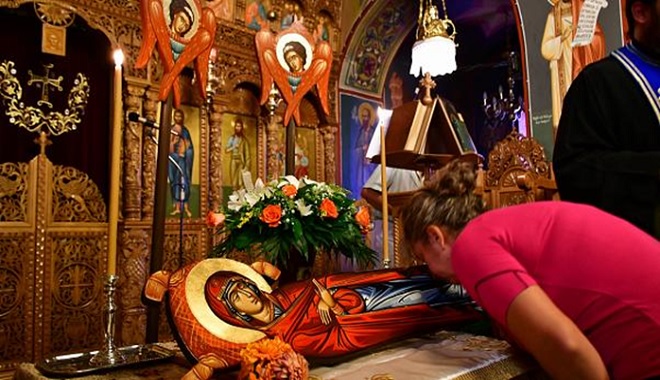‘Most Pure Lady, heal me from the ills of the passions…’
12 August 2023Exhausted by the intensity of his struggle against the passions and the devil, the hymnographer seeks our Lady as valuable support, which is why in the small supplicatory canon he cries out to her: ‘Most Pure Lady, heal me from the ills of the passions’. These words express the dramatic nature of the struggle undertaken by believers in order to deny the ‘old person’ (Col. 3, 9), that is the person of sin, and to be cured of the ills of the passions.
The sickness of the passions entered human nature because, through sin, we perverted the natural terms of our existence. Since God is love (1 Jn. 4, 8), it follows that we, having been created in his image, have love as an ontological, i.e. innate, feature of our nature. But although we were created by God in accordance with this ‘blueprint’, we distorted our nature through the misuse of our freedom. Instead of loving God, and other people, unselfishly, which is our natural state, we were led into the absurd love of ourself, which is the mother of the passions of pride, avarice, vindictiveness and so on, which are unnatural states.

When the body becomes sick, it doesn’t run smoothly and its functions aren’t properly coordinated. In the same way, because of its subjugation to the passions, the soul becomes sick, because it isn’t functioning in accordance with the terms set by God the Creator, but by the rules of sin, which are the passions. This is a sickness, and we’re called upon to seek a cure, so that we can be brought back from our unnatural condition to our natural state, i.e. virtue, and thus regain the health of our soul.
Mary the Mother of God gave birth to the Son of God, who, when he’d been clad in our human nature, healed it from the passions and sin. He renewed it and gave it life. He restored it to its proper mode of operation and also showed us, through his own life, the way to find healing. As the late elder Iosif Vatopaidinos emphasizes, the Gospel commandments he gave us aren’t laws dictated by a God who’s autocratic, but are rather the medication for our recovery from the passions and sin. We have to keep the Gospel commandments and copy our model, Jesus Christ, if we’re going to achieve healing from the passions and sin.
Although divine grace cures us of the passions and sin, and even though sanctification is a gift from God, bringing our spiritual life to fruition still requires our cooperation and consent. The spiritual struggle against the passions is the practical expression of this compliance, of the voluntary pivoting of our will towards God. It’s this which draws the response from divine grace which effects our salvation.
Our main adversary in the spiritual struggle is the devil, who is always putting obstacles in the spiritual path of the faithful, hoping to disrupt the work of salvation and to show that it’s he who is the dominant power in the world. This is why the poet, who’s worn-out by the merciless and relentless war with the devil, hastens to our Lady and says: ‘I am unable to bear the attacks of the demons’, seeking her help because he is ‘beset on all sides’ and has ‘no comfort but you, Mistress of the world’.
The spiritual struggle requires ascetic effort and labors. ‘Surrounded by many temptations’, that is, troubled and hindered by the machinations and temptations from the devil, the faithful have to use all their spiritual weapons, which are fasting, vigilance, prayer, alms-giving and all the ascetic methods taught us by our saints. But we’re not alone in this spiritual fight, which is why he recognizes the aid of our Lady, which drives away ‘the assaults of the temptations and the attacks of the passions’.
When Lot and his family abandoned the city of Sodom because it was about to be destroyed, they were told by God not to look back as they were leaving. But his wife didn’t obey and became ‘a pillar of salt’ (Gen. 19, 26). So let us, also, who’ve taken the decision to leave behind our former life, the life of the passions and sin, and to progress along the path of virtue, not look back as Lot’s wife did. This is the advice of Saint John of the Ladder, lest we remain in thrall and subjection to the passions and sin. Let us imitate our all-pure, all-spotless, most holy Mother of God whose whole life was one of sanctity, virtue, humility and dedication to the will of God. She was truly a vessel of divine grace.






